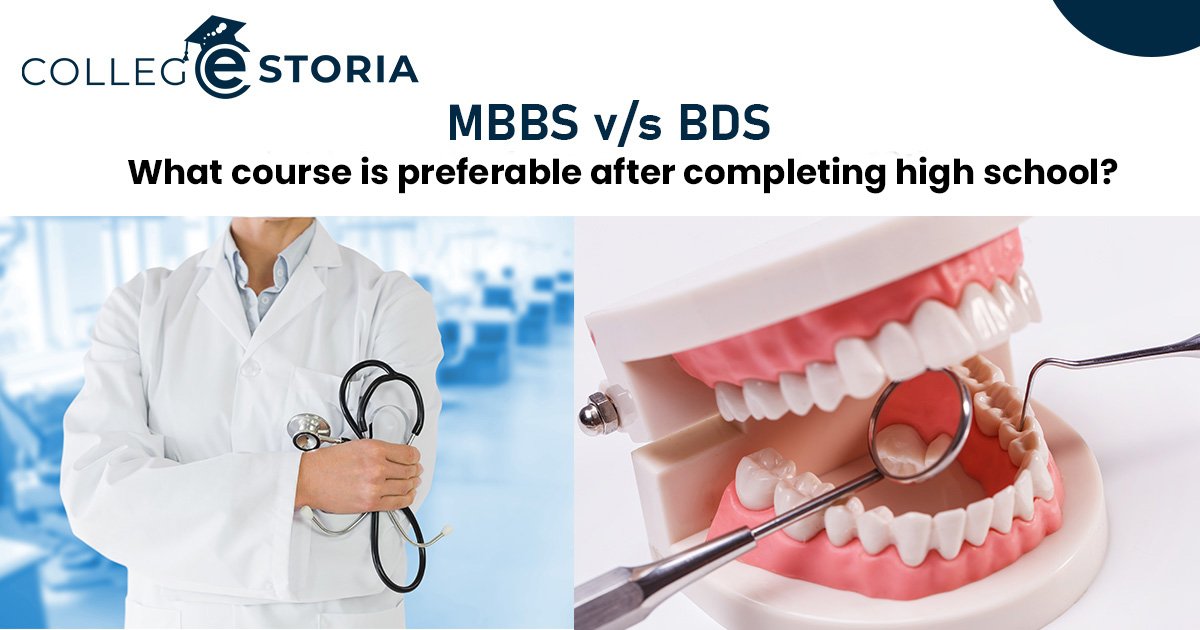In the vast landscape of career choices after completing Class 12 in the Science stream, pursuing either MBBS or BDS remains one of the most crucial and challenging. To help aspiring students navigate through this maze of options Collegestoria plays a pivotal role. In this article, we will delve into the comparison between MBBS and BDS, shedding light on various aspects such as course details, admission processes, syllabi, and career opportunities.
MBBS vs BDS – Brief Overview of the Courses
In India, the Bachelor of Medicine, Bachelor of Surgery (MBBS) is the epitome of the medical profession. It is the most sought-after undergraduate course among Class 12 Science (PCB) students, being the sole certified pathway to becoming a modern medicine doctor. The course, regulated by the Medical Council of India (MCI), spans 5.5 years, including four and a half years of theory and one year of mandatory internship.
On the other hand, the Bachelor of Dental Surgery (BDS) is a five-year undergraduate course regulated by the Dental Council of India. It prepares students for a career in dentistry, encompassing four years of theory and a one-year rotatory internship.
Admission Process – NEET as the Gateway
The admission process for both MBBS and BDS requires candidates to qualify for the National Eligibility cum Entrance Test (NEET). NEET serves as a single entrance test for admission to medical and dental colleges across India, making it a crucial stepping stone for aspiring doctors and dentists alike. While the NEET examination is common, the counselling processes for MBBS and BDS are distinct, requiring separate registrations and considerations.
Syllabus Comparison – A Glimpse into the Academic Journey
The syllabus for MBBS and BDS reflects the depth and breadth of knowledge required in the respective fields. MBBS covers pre-clinical, para-clinical, and clinical phases, including subjects like Anatomy, Physiology, Pharmacology, and Clinical specialisations. BDS, in contrast, focuses on dental-related subjects such as Oral Pathology, Periodontology, and Orthodontics, alongside general medical subjects during the initial years.
Career Opportunities – Charting Paths After Graduation
Upon successful completion of MBBS, many career opportunities unfold for aspirants. From becoming doctors and surgeons to venturing into research and academia, the possibilities are extensive. Job roles include Doctors, Junior Doctors, Physicians, Surgeons, Medical Professors, Researchers, and Scientists.
For BDS graduates, the avenues are equally diverse. Apart from setting up a private practice, they can explore roles as consultants, teachers, and oral healthcare specialists.
Collegestoria’s Guidance – Navigating the Educational Landscape
In the labyrinth of choices, Collegestoria emerges as a guiding light for students. This educational consultant assists in making informed decisions by providing comprehensive insights into various courses, their structures, and the career trajectories they lead to. Collegestoria’s approach involves understanding individual aspirations, aligning them with educational goals, and steering students towards the most fitting academic path.
Conclusion
Choosing between MBBS and BDS is a significant milestone, and the decision should be rooted in a thorough understanding of the courses and their implications. Educational consultants like Collegestoria act as beacons, illuminating the path for students and aiding them in making choices that align with their passions and aspirations. By weighing the pros and cons, understanding the admission processes, and envisioning future career opportunities, aspiring medical professionals can embark on a journey of education that lays the foundation for a fulfilling and impactful career.
